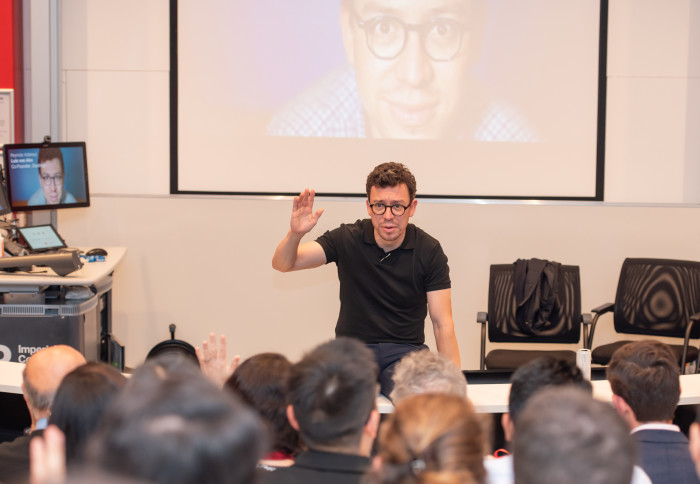Duolingo’s Luis von Ahn shares insights on building an American edtech giant

The success of the language learning platform Duolingo, was the focus of a talk at Imperial College Business School this month.
Speaking to an audience of staff, students and alumni, Duolingo Co-Founder Luis von Ahn talked about his passion for education and the challenges of building a successful edtech venture. He also discussed Duolingo’s launch of a new maths app to help people improve their basic maths skills.
Welcoming Mr von Ahn, Professor Francisco Veloso, Dean of Imperial College Business School, recalled his previous encounter with the entrepreneur from their days together at Carnegie Mellon University. Professor Veloso was an assistant professor at the time and Mr von Ahn was a computer science PhD student.
“We left the same year, 2012, for different journeys – I headed back home to Portugal to become a Dean in Lisbon and Luis took the entrepreneurial journey,” he said.
The Business School’s commitment to nurturing the next generation of entrepreneurs was highlighted by Professor Veloso in his welcome address. “When we think about digital transformation, about students getting support from the university to really commercialize and accelerate technology, this is a very important strategic priority,” he said.
A passion for education and entrepreneurship
Mr von Ahn made connections between his university experience with his entrepreneurial pursuits. He recalled his experience of attending a talk by the chief scientist at Yahoo about the ten problems that the company could not solve. Nine of them didn’t resonate, but the tenth one, about how to distinguish between humans and bots on computers? “I’m like, maybe I can solve it,” he said.
“At some point, I believe that computers will be able to teach better than humans." Luis von Ahn Co-Founder of Duolingo
After a chat with his PhD advisor, they discovered that humans could see distorted text, while computers could not. The solution was CAPTCHA, the challenge response test used to determine if a user is human. Within two weeks, the test was on the registration page at Yahoo and companies began copying the concept soon after.
A foray into digitizing books resulted in the discovery that computers could not recognize words on the faded pages of older books. This led to the development of reCAPTCHA and, eventually, the sale of two companies to Google. “I had solved my financial problems for the rest of my life,” he said.
Discussing his passion for education and the creation of Duolingo, which he founded with fellow PhD student Severin Hacker, he said: “A lot of people talk about education as something that brings equality to different social classes. I always thought it’s the complete opposite. So, I wanted to give equal access to education to everybody.”
The founders of Duolingo decided that the focus of the platform should be on teaching languages, particularly English. “Knowledge of English, in most countries in the world, can significantly increase your compensation,” he said. “You’re a waiter, you learn English, now you’re a waiter at a hotel making more money.”
The sophistication of Duolingo’s learning model, which includes gamification as well as user data on learning patterns, contributes to its success as the world’s most-downloaded education app. The company also offers an online English proficiency exam that provides an option for students who can’t access a physical testing centre or afford the fee for a traditional pen-and-paper standardized test. This test is used by Imperial College Business School.
New maths app
Mr von Ahn discussed Duolingo’s recent introduction of an app to teach maths. While designed for young learners, Luis said most of the users are adults, eager to refresh their basic math skills.

Mr von Ahn later joined a panel with Professor Chris Tucci, Director of the Centre for Digital Transformation at the Business School, Sarah Grant, Director of Imperial’s EdTech Lab and Michelle Rogan, Professor of Strategy and Entrepreneurship, for a discussion about technology’s impact on teaching and learning.
Near the end of the evening, Mr von Ahn concluded that, “At some point, I believe that computers will be able to teach better than humans,” he said, adding, “I also think computers will be better at being a CEO. Then, I’ll be totally out of a job.”
This article was written by a freelancer, Anna Esaki-Smith.
Article text (excluding photos or graphics) © Imperial College London.
Photos and graphics subject to third party copyright used with permission or © Imperial College London.
Reporter
Laura Singleton
Communications Division